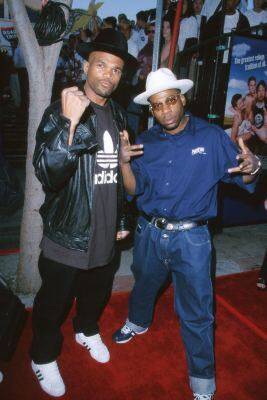Silence, Betrayal, and Justice: Why It Took Two Decades to Find Jam Master Jay’s Killers”
By: S. Wilson

The murder of Jam Master Jay, legendary DJ of Run-DMC, was more than a loss for hip-hop. It was a wound that remained open for over two decades. For 22 years, the case sat in the shadows, lingering as one of rap’s most infamous unsolved killings. The question was always the same: how could someone murder a cultural icon in his own Queens studio and vanish without justice?
The answers are as complex as the man himself. Jason “Jam Master Jay” Mizell wasn’t just a DJ—he was a bridge between the streets and the industry, a mentor who opened doors for countless young artists. His death in 2002 sent shockwaves through music and beyond. Yet, almost immediately, investigators faced silence. Witnesses were reluctant to come forward. The streets talked, but not to the police. Fear of retaliation—and distrust of law enforcement—kept lips sealed.
Complicating matters further, Jay’s killing was not the typical story of a rap star targeted for fame or fortune. Federal prosecutors now say it was tied to a drug dispute involving two men he trusted most: his godson, Karl Jordan Jr., and his so-called childhood friend, Ronald Washington. That betrayal, the idea that the shooter was someone inside his circle, made the crime even harder to untangle. Detectives had to sift through rumors, conflicting accounts, and a wall of silence that stretched on for decades due to the "No Snitching" street code.
The eventual breakthrough came not from sudden discovery, but from persistence. Federal prosecutors leaned on witnesses who had lived with the burden of silence for years. Advances in witness protection, renewed federal interest, and the mounting weight of the truth finally pried open the case. In 2020, nearly 18 years after the crime, indictments were unsealed and in 2024, a jury found Jordan and Washington guilty of the murder that had haunted hip-hop for a generation.
Why did it take 22 years? Because Jam Master Jay’s murder was more than just another crime. It was a betrayal mixed with loyalty, fear, and silence as a reminder of how violence and mistrust can cripple communities. The justice system moved slowly, but it moved nonetheless.
Today, as the music world reflects on his legacy, the verdict is bittersweet. It cannot bring Jay back, nor erase the decades of unanswered questions. But it does close a chapter, offering his family, friends, and fans something they’ve long been denied: THE TRUTH.
Jam Master Jay helped make hip-hop global, but his death is a reminder of its roots in struggle, loyalty, and survival. His legacy is not only the beats that shook the world it’s also the lesson that justice, however delayed, is worth the fight.




